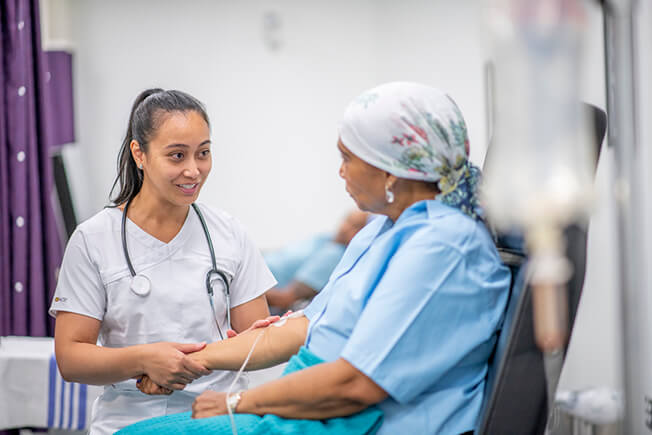Immunotherapy for breast cancer patients

Leading oncology experts, physicians, and researchers are continuously working to identify innovative approaches to limiting a person's unique cancer risk, controlling the spread of the disease in the body, and eliminating certain types of cancer altogether. While new breast cancer treatments continue to be developed, the key to effective cancer prevention and control might come from cancer patients themselves – or at least from their immune systems.
Immunotherapy is an innovative treatment that combines these efforts by utilizing the power of the body's natural immune system to maximize an individual's potential for cancer resistance and to optimize their success while undergoing treatment. From preventive vaccines to cutting-edge interventional techniques, immunotherapy has already led to significant breakthroughs in the treatment of breast cancer and a variety of other cancers.
What is immunotherapy?
Our immune systems are comprised of organs, cells, and other organic materials in the body that serve as our first line of defense against infection, illness, and disease. Cancer immunotherapy, sometimes referred to as immuno-oncology, is a form of treatment that utilizes the immune system in order to enhance the ability to inhibit and attack cancerous cells in the body.
When implemented successfully, immunotherapy has the potential to:
- Train the immune system to identify and attack specific cancer cells
- Strengthen existing immune cells to boost their cancer elimination response
- Supplement the body's overall immune response
Immunotherapy treatments come in different forms. Many include targeted antibodies and other cancer-specific vaccines while others involve more progressive approaches like adaptive cell transfers or tumor-infecting viral agents. Other immunotherapy treatments may be referred to as gene therapies, as they use genetic engineering to enhance the cancer-fighting capabilities of immune cells.
Immunotherapy for breast cancer
With over 270,000 new cases of breast cancer diagnosed each year, the need for potent and lasting treatments is urgent. While current treatment methods typically involve surgery or a variety of radiation therapies, recent clinical studies have shown that immunotherapy also has the potential to improve outcomes for breast cancer patients.
In breast cancer care, immunotherapies are almost always used in conjunction with radiation therapy, chemo, or surgery in order to optimize the prevention, management, and elimination of cancerous cells in the body. The physicians, surgeons, and immunologists in Main Line Health's Breast Cancer Program are passionate about delivering the best possible outcomes for our patients. Because every cancer diagnosis is different, we utilize individualized and highly-informed treatment plans that cater to each patients' unique genetic makeup, family history, and current health status.
Main Line Health is at the forefront of breast cancer research, immunotherapy clinical trials, and new frontiers in cancer treatment. We prioritize patient comfort and safety above all else, which is why we only incorporate innovative therapies, medications, and surgical interventions once they have been thoroughly researched and trialed. When immunotherapy is an appropriate option to explore, any and all treatment decisions rely on the informed consent of the patient, their cancer care team, and the expert guidance of an immuno-oncologist. If you believe immunotherapy could be added into your cancer care, talk to your doctor to determine your eligibility and discuss your personalized treatment options.
Next steps:
Learn more about breast cancer prevention and diagnosis
View current breast cancer clinical trials
 Content you want, delivered to your inbox
Content you want, delivered to your inbox
Want to get the latest health and wellness articles delivered right to your inbox?
Subscribe to the Well Ahead Newsletter.
